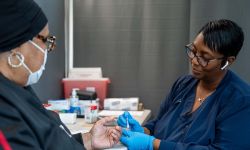COVID vaccine for 825,000 Michigan children nearer to federal approval
Nov. 9: COVID shots for young kids adds confusion to Michigan school mask mandates
Nov. 3: Child COVID vaccines are available in Michigan. Now comes the hard part.
Nov. 2: CDC approves COVID vaccine for kids 5 to 11, shots available immediately
Oct. 29: COVID vaccine for kids 5 to 11 clears another federal hurdle
A federal health advisory panel voted overwhelmingly Tuesday to recommend approval of Pfizer’s COVID vaccine for children 5 to 11, a group that covers roughly 825,000 youngsters in Michigan.
The Food and Drug Administration panel’s guidance could lead federal health authorities to formally approve the two-dose regimen for young children as soon as next week.
With impending emergency approval in mind, Gov. Gretchen Whitmer issued an executive order Tuesday seeking to expedite shipments of the pediatric vaccine to Michigan.
Related stories:
- Michigan Senate OKs longshot bills to stop student COVID mandates
- Where to get COVID vaccine boosters in Michigan
- They disagreed, but both caught hell. Welcome to Michigan’s mask mandate wars
- Federal authorities to weigh COVID vaccine for children 5 to 11 Tuesday
“This is an age group that deserves and should have the same opportunity to be vaccinated as every other age,” Dr. Amanda Cohn, chief medical officer of the CDC’s National Center for Immunizations and Respiratory Diseases, told the panel at the end of its day-long meeting.
The recommendation, however, didn’t come without heartburn. Several advisors said the decision was particularly difficult, even as 17 of 18 panel members recommended the vaccine’s emergency authorization. (One member abstained.)
There were concerns about whether schools might try to mandate the vaccines, and questions about the extent to which children contribute to COVID’s spread. Tens of millions of children likely have been infected already, which can contribute to herd immunity, said Dr. James Hildreth, CEO of Meharry Medical College in Nashville.
“It just seems to me that in some ways we're vaccinating children to protect the adults and it should be the other way around,” Hildreth said at the meeting. “Our focus should be to get the adults vaccinated to protect the children, so this is a really tough one for me.”
Still, he added, high-risk children should have access to the vaccine, and he later said he voted in favor of authorizing the vaccine so those higher-risk children could get it.
Others noted the low risk of side effects and that studies on the Pfizer vaccine’s impact on children will continue. Pfizer is the first of three U.S.-approved vaccines to seek federal approval for younger children, though a version by manufacturer Moderna is on its heels.
“I think there are a number of things that are reassuring,” Dr. Paul Offit, director of the Vaccine Education Center at Children’s Hospital of Philadelphia, said as the committee moved toward a vote.
Pfizer’s vaccine is more than 90 percent effective for this age group, according to the manufacturer. (Pfizer already provides vaccines for those 12 and older.)
And while children are far less likely to be hospitalized or die from the virus, they are not immune. More than 600 pediatric deaths have been reported nationally, and in Michigan, Multisystem Inflammatory Syndrome in Children, a serious condition in which a COVID infection inflames organs and tissues, has been reported in 172 children, with 122 of them admitted to the ICU, according to the latest state data.
Offit also noted that younger children will receive a lower dose of the Pfizer vaccine than older children and adults and that the incidence of myocarditis, or inflammation of the heart muscle, from taking the vaccine remains low — seemingly lower than in older adolescents. A recent study also indicated there is greater risk of myocarditis from contracting the virus than from taking a vaccine.
“I think there are some children … who are deserving of this and may very well derive benefit, but there are other children who may be at increased risk of myocarditis,” said panel member Dr. H. Cody Meissner, of the Tufts University School of Medicine.
The FDA must continue to monitor the vaccine for safety, he said.
FDA scientists, in their briefing document to the committee, said the risks associated with a COVID infection outweigh the risk of complications from the vaccine. The two doses are given three weeks apart.
“I know enough to move forward” with the vote, Offit said during the day-long meeting.
The decision Tuesday from the independent advisory group now goes to the FDA for the final say on whether the vaccine will be authorized. The U.S. Centers for Disease Control and Prevention will then decide how it will be used. Its advisory committee is scheduled to meet Tuesday and Wednesday of next week.
If both the FDA and CDC sign off, the pediatric Pfizer vaccine could be available to children as soon as later next week.
Efforts to vaccinate the state’s children against COVID, however, will take a different shape than mass vaccines for adults and older children, providers and health officials have told Bridge Michigan. Anxious children may need more privacy than a large vaccine clinic can offer, for example.
The rollout will rely, too, on the efforts of pediatricians’ offices, family doctors and community clinics, where parents can ask questions of doctors with whom they have established and trusted relationships.
COVID vaccine efforts also may offer providers a chance to talk with parents about catching up children on other vaccines that have been widely delayed or neglected during the pandemic, Dr. Jennifer Morse, medical director for District Health Department #10 and the Central Michigan District Health Department, said Tuesday at a news conference for Traverse City-based Munson Healthcare.
It’s unclear what kind of demand there will be for the pediatric vaccines, complicating planning efforts, Morse and others have said. A sizable minority of Michigan residents have declined to take a COVID vaccine despite their general availability across the state.
“The good thing is (that) our nurses give a lot of vaccines to a lot of kids of all ages, and they're extremely good at it. And so for them, it's not really anything different than a normal Tuesday,” Morse said.
See what new members are saying about why they donated to Bridge Michigan:
- “In order for this information to be accurate and unbiased it must be underwritten by its readers, not by special interests.” - Larry S.
- “Not many other media sources report on the topics Bridge does.” - Susan B.
- “Your journalism is outstanding and rare these days.” - Mark S.
If you want to ensure the future of nonpartisan, nonprofit Michigan journalism, please become a member today. You, too, will be asked why you donated and maybe we'll feature your quote next time!





